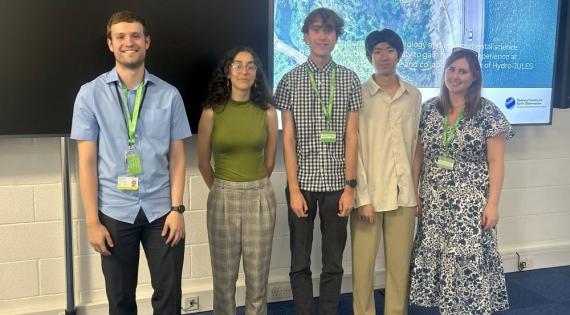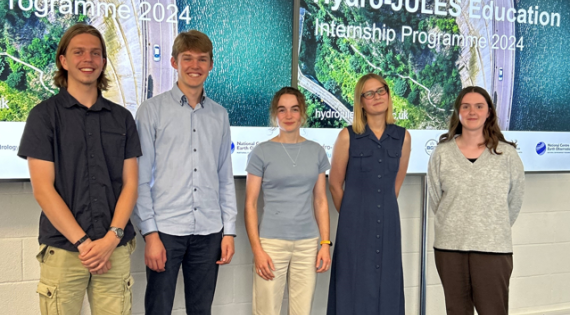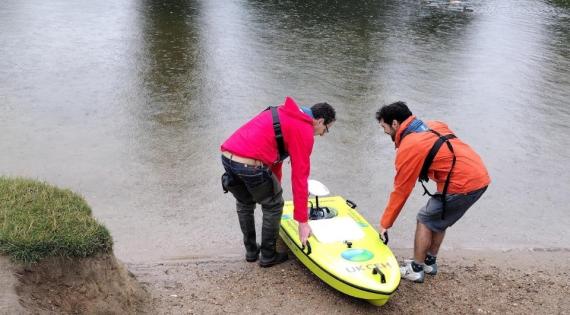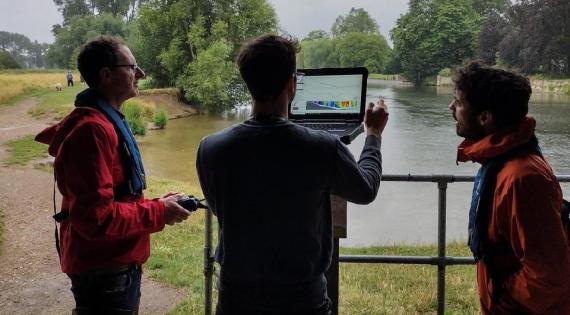Hydro-JULES Internships 2026
Hydro-JULES Internships 2026
We are excited to offer three new internship positions as part of our Hydro-JULES internship programme.
This is a fantastic opportunity to gain hands-on experience in hydrological science and applied research. You’ll develop valuable skills and insights that will shape your academic, professional, and personal growth.
Our science makes a real difference, enabling people and the environment to prosper, and enriching society. We are the custodians of a wealth of environmental data, collected by UKCEH and its predecessors over the course of more than 60 years.
If you are passionate about hydrology and environmental science, the Hydro-JULES Intern Programme is the perfect opportunity to gain hands-on experience and collaborate with our team of Hydro-JULES scientists.
Internships are available at our Wallingford site. Internship dates are not flexible; you must be available to work at our site from the 22nd June – 31st July.
Each placement is different and you are welcome to apply for more than one.
• Location: Wallingford - Hybrid working will not be considered
• Type: Full-time (37 hours per week)
• Programme Dates: 22 June – 31 July 2026
• Gross salary: £3,024 (before deductions)
• Application Deadline: Midnight, Wednesday, 25th March 2026
• Interviews: 20th April – 4th May 2026
Accommodation is NOT provided by UKCEH. Successful applicants are responsible for finding and for covering accommodation and living costs for the duration of the internship.
Gain invaluable experience in environmental research
Work on meaningful projects with real world impact
Develop skills that support both academic and professional growth
Build confidence working alongside experienced scientists and research teams
Strengthen your CV and gain insight into careers in environmental science
• Be able to work full time (37 hours per week) at the appropriate site for the duration of the internship.
• Current undergraduate or postgraduate (including PhD) student or have graduated within the six months prior to the start of the internship – please check individual project requirements
• Studying a relevant degree
• Have the right to live and work in the UK for the duration of the internship
• Comfortable working independently with strong communication and interpersonal skills
• A collaborative team player who is confident giving and receiving feedback
Successful applicants must also agree to the following:
• Provide a one-page report to their supervisor describing the visit and its accomplishments, plus a short testimonial within 30 days of completion of the visit.
• Agree to appear in publicity and promotion materials for UKCEH.
• Agree to produce and present a poster, or give a presentation at a Hydro-Jules event.
• Acknowledge the support of Hydro-JULES funds in any publications or presentations arising from the visit.
1. Check you’re eligible
You must be a current undergraduate or postgraduate (including PhD) student or have graduated within the six months prior to the start of the internship
You must be able to work full‑time (37 hours/week) for the 6‑week summer placement
You must have the right to live and work in the UK
2. Prepare three documents
Provide a support letter from your tutor/supervisor approving the internship.
Write a tailored covering letter saying why you want the internship and which project(s) you would like to apply to.
Provide a short CV with your education and experience.
3. Choose your project
Project 1 – Coupling the regionalized hydrologic projections with climate and physiographic characteristics for ungauged catchments under changing climate.
Project 2 – How do Floods Happen? Characterising UK Flood Events Using National Sub-Daily Rainfall and Flow Datasets.
Project 3 – National-scale flood forecasting – what can distributed hydrological models bring to Wales?
4. Submit online
Visit Internships on our UKCEH career page: Internship and PhD opportunities | UK Centre for Ecology & Hydrology
Apply through the job portal before the closing date: APPLY HERE
Applications will not be accepted by email.
Don’t miss out on this exciting opportunity to make a difference! – APPLY NOW!
You will carry out work for UKCEH under a contract of services agreement via Hays PLC (Company Number 02150950). You will be paid weekly by Hays PLC by submitting a timesheet to your UKCEH Line Manager.
Please note: Unfortunately, we are unable to offer visa sponsorship for this role and this does not qualify for endorsement to support a Global Talent Visa application.

UKCEH recently hosted a group of early career researchers as part of the Hydro-JULES internship programme, a six-week placement designed to build skills in hydrological science and environmental data analysis.
Delivered in partnership with the University of Reading, NCAS, Coventry
University, and the British Geological Survey (BGS), this year’s internship offered hands-on experience across a range of water-related research topics, including:
In addition to their research, interns participated in field trips to Cholsey Marsh to measure river flow and visited the Wallingford meteorological site to learn about long-term climate monitoring. They also took part in personal development days focused on science communication and career planning, helping them build confidence and clarity in their future pathways.
The programme culminated in a series of final presentations, where interns shared their findings and reflected on their experiences. PowerPoints and audio recordings are available below
Supervisors - Elizabeth Cooper (UKCEH), Sarah L Dance (NCEO / U.Reading), Sonja Folwell (UKCEH), and Visweshwaran Ramesh (NCEO / U.Reading)
Watch Jake's presentation here: https://www.youtube.com/watch?v=oRyCO1RQYlM
Supervisors - Steven Cole (UKCEH), Robert Moore (UKCEH), John Wallbank (UKCEH), David Dufton (NCAS)
Watch Heron's presentation here: https://www.youtube.com/watch?v=CxQo-hT08tw
Supervisors: Wilson Chan (UKCEH), Amulya Chevuturi (UKCEH), Eugene Magee (UKCEH), Rachael Armitage (UKCEH) and Bastien Dieppois (Coventry University)
Watch Emma's presentation here: https://www.youtube.com/watch?v=Yb11HGp9FtU
Supervisors: Helen Baron (UKCEH), Virginie Keller (UKCEH)
Advisor: Amber Reynolds (UKCEH)
Watch Ilaria's presentation here: https://www.youtube.com/watch?v=S5LI0vToJsc
Supervisors: Marco Bianchi (BGS) , Andrew Hughes (BGS)
Location: This role will be based at the BGS offices in Keyworth.
Watch James' presentation here: https://www.youtube.com/watch?v=DK9-yB7GS5Y

Last year’s interns undertook a wide range of research projects that showcased the diversity of environmental science within UKCEH. With backgrounds in various academic fields, our five interns spent six weeks deeply engaged in their projects. They had opportunities to conduct fieldwork, create content for short films, and collaborate with experts in their research areas, develop their skills and grow their confidence.
Our two Hydro-JULES interns completed their placements with us on 18 August 2024 by presenting their work to members of the Hydro-JULES project team.
Danny Cooper mentored by Brenda D’Acunha and Ross Morrison presented his work on ‘quantifying water productivity and carbon intensity of food and bioenergy production systems' and Felipe Feleni, mentored by Amulya Chevuturi, Doran Khamis, Gianni Vesuviano, and Matt Fry, presented his work ‘Exploring the drivers of variability in flood events across the UK’ first.'.

Waterborne: Nick (left) and Doran launch the boat into the river Thames at Wallingford

Watching the river flow: Nick, Felipe and Doran monitor data transmitted from the ARC boat.
I really found it useful seeing the working of the workplace with project hours etc and very much enjoyed seeing how data science and statistics is applied to different fields.
- Daniel Cooper, UEA
The project was interesting and provided an opportunity to chat with people that I knew from my PhD, as well an opportunity to meet another research environment. Doran and Amula have been great supervisors on all matters, from technical knowledge to help with my integration with the workgroup and workplace. My advisors Gianni and Matt, have also been involved in the project and have supported me with technical knowledge when needed.
- Felipe Fileni, U. Newcastle
Congratulations to both Felipe and Danny for all the work they managed to achieve in their short time at UKCEH and for their excellent presentations.
For enquiries, please contact us at hydrojules@ceh.ac.uk.